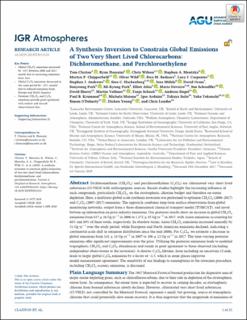A Synthesis Inversion to Constrain Global Emissions of Two Very Short Lived Chlorocarbons: Dichloromethane, and Perchloroethylene
Claxton, Tom; Hossaini, R.; Wilson, C.; Montzka, Stephen A.; Chipperfield, Martyn P.; Wild, Oliver; Bednarz, Ewa M.; Carpenter, Lucy J.; Andrews, Stephen J.; Hackenberg, Sina C.; Mühle, Jens; Oram, David; Park, Sunyoung; Park, Mi-Kyung; Atlas, Elliot; Navarro, Maria; Schauffler, Sue; Sherry, David; Vollmer, Martin K.; Schuck, Tanja; Engel, Andreas; Krummel, Paul B.; Maione, Michela; Arduini, Jgor; Saito, Takuya; Yokouchi, Yoko; O'Doherty, Simon; Young, Dickon; Lunder, Chris Rene
Peer reviewed, Journal article
Published version
Permanent lenke
https://hdl.handle.net/11250/2724282Utgivelsesdato
2020Metadata
Vis full innførselSamlinger
- Publikasjoner fra Cristin - NILU [1377]
- Vitenskapelige publikasjoner [1112]
Originalversjon
Journal of Geophysical Research (JGR): Atmospheres. 2020, 125, e2019JD031818. 10.1029/2019JD031818Sammendrag
Dichloromethane (CH2Cl2) and perchloroethylene (C2Cl4) are chlorinated very short lived substances (Cl‐VSLS) with anthropogenic sources. Recent studies highlight the increasing influence of such compounds, particularly CH2Cl2, on the stratospheric chlorine budget and therefore on ozone depletion. Here, a multiyear global‐scale synthesis inversion was performed to optimize CH2Cl2 (2006–2017) and C2Cl4 (2007–2017) emissions. The approach combines long‐term surface observations from global monitoring networks, output from a three‐dimensional chemical transport model (TOMCAT), and novel bottom‐up information on prior industry emissions. Our posterior results show an increase in global CH2Cl2 emissions from 637 ± 36 Gg yr−1 in 2006 to 1,171 ± 45 Gg yr−1 in 2017, with Asian emissions accounting for 68% and 89% of these totals, respectively. In absolute terms, Asian CH2Cl2 emissions increased annually by 51 Gg yr−1 over the study period, while European and North American emissions declined, indicating a continental‐scale shift in emission distribution since the mid‐2000s. For C2Cl4, we estimate a decrease in global emissions from 141 ± 14 Gg yr−1 in 2007 to 106 ± 12 Gg yr−1 in 2017. The time‐varying posterior emissions offer significant improvements over the prior. Utilizing the posterior emissions leads to modeled tropospheric CH2Cl2 and C2Cl4 abundances and trends in good agreement to those observed (including independent observations to the inversion). A shorter C2Cl4 lifetime, from including an uncertain Cl sink, leads to larger global C2Cl4 emissions by a factor of ~1.5, which in some places improves model‐measurement agreement. The sensitivity of our findings to assumptions in the inversion procedure, including CH2Cl2 oceanic emissions, is discussed.

